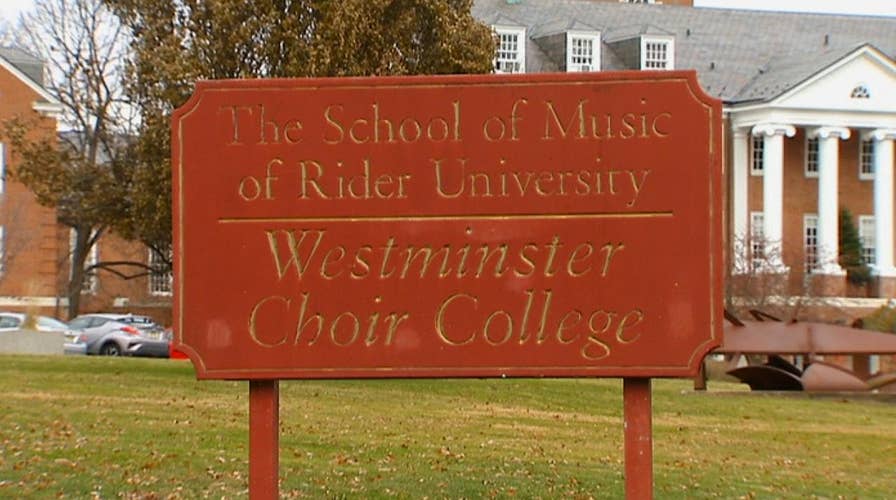A renowned American college has, critics say, been targeted by China.
For almost 100 years, Westminster Choir College, nestled in the exclusive confines of Princeton, N.J., has been one of the nation's premier academic institutions for advanced musical studies, training ministers of music in the Christian evangelical tradition.
But worried alumni now warn all that could be doomed, because a Chinese education company that they claim has really been a Chinese government-owned defense contractor for the Chinese Navy is trying to buy it.
"Westminster Choir has performed with the New York Philharmonic more than any other organization, over 300 times," said Constance Fee, a Westminster graduate who is a professor of vocal studies at Roberts Wesleyan University and who was a renowned international opera singer for decades.
"It can't be sold."
She and her alumni group, the Westminster Foundation, have sued to stop the sale, claiming that if Rider University, which runs Westminster, is allowed to sell it the Chinese government would have a direct foothold in America academia.
CLICK HERE TO GET THE FOX NEWS APP
"There is no other institution like this in the world. There is one choir college in the world and this is it," Fee said proudly. "I can't image why they particularly might want it, but I'm not convinced it's to run a choir college."
The group's lawsuit claims that the company intended to run the school, Princeton Westminster International, is really owned by Bejing Wenhuaxuexin Education, which is a subsidiary of Bejing Kaiwen Education Technology, "a for-profit Chinese entity owned and controlled by the government of China."
The lawsuit also says that just three weeks before it announced its intent to buy Westminster, Kaiwen changed its name from Jiangsu Zhongtai Bridge Steel Structure Company, "a manufacturer of components of Chinese naval vessels and is a defense contractor" for China's military," in order "to create the veneer and seeming appearance of an education entity to justify its acquisition of Westminster Choir College."
So, why would the Chinese government, and a firm allegedly with a history of serving as a Chinese military contractor, want to buy a small school in Princeton?
"A very good question, Princeton is not anyplace USA," notes the alumni group's lawyer, Bruce Afran. He suspects Beijing’s interest could really be aimed at exploiting Princeton's reputation as a center of studies for the U.S. intelligence community.
He points out that the U.S. government maintains contracts at known research centers in high tech, defense and cyberspace that happen to be near the school's campus.
"I don't think it is a coincidence that the government of China is focusing its attention on this tiny music school in one of the most sensitive centers of intelligence and defense research in the world," he observes.
"For the first time in American history, an American college would have been taken over by a unit of a foreign authoritarian foreign dictatorship, which is what China is. The sad reality is that academic freedom disappears, true education disappears, the ability to create music, drama culture, to study religion disappears because all of these things are subject to censorship in China."
BACKLASH AT CHINESE UNIVERSITY SHOWS LIMITS TO SURVEILLANCE
Afran said the agreement stipulates that Kaiwen must keep operating Westminster as a music college for five years following its purchase, but after that time elapses all bets are off.
"It makes no sense for the Chinese government to buy a music school in the United States, so we have to be concerned that there is something here that we don't understand," said Asia expert Gordon Chang, author of "The Coming Collapse of China."
Chang warns about Beijing’s creeping influence in our country, especially on college campuses, and said the attempt to buy Westminster could be part of China's propaganda strategy.
"We have permitted Chinese agents to operate on American soil, especially on American campuses to try and influence American public opinion and also to change the discourse in the United States about China, and one of their main initiatives are college campuses. So until we sort this out, and we are a long way from that point, we should not be allowing them to buy Westminster."
The opposition to the sale comes as other American institutions of higher learning are having second thoughts about partnering with Chinese entities.
The University of Rhode Island is the latest to announce that it is ending its partnership with the controversial Confucius Institute, which operates on more than 100 American campuses. The Institute is funded by the Chinese government and claims to promote Chinese language and culture. But the FBI is concerned that Beijing could be using the guise of academia to collect American intelligence, and is reportedly monitoring the Institute.
"They're exploiting the very open research-and-development environment that we have," FBI Director Christopher Wray testified before the Senate Intelligence Committee in February.
"The use of nontraditional collectors, especially in the academic setting, whether it's professors, scientists, students, we see in almost every field office that the FBI has around the country."
Sen. Ted Cruz, R-Texas, has introduced legislation named the Stop Higher Education Espionage and Theft Act, to address the concern.
"Communist China is infiltrating American universities to meddle with our curricula, silence criticism of their regime, and steal intellectual property including sensitive dual-use research," the senator tweeted in May.
"The American government needs new tools to protect the integrity of our universities and research, and to block academic espionage."
Rider University, which put Westminster on the market, would not offer a school official for a Fox News on-camera interview and did not agree to respond to our written questions about the proposed sale. The university directed Fox News to its website.
In a recent statement, Larry J. Livingston, interim president of the Westminster Choir College Acquisition Corporation, wrote, in part:
"Kaiwen operates two prominent K-12 international schools in Beijing, China for series and talented youth. It is planning several more international school campuses to carry out the mission of educating young people to become open-minded, inquiring, courageous, reflective, principled, and caring citizens through educational focus on an international curriculum of humanities, science, arts and sports...I wouldn't have accepted the challenge if I didn't see Kaiwen Education as an outstanding partner capable of preserving what's best about WQCC and committed to its mission."
Our request for comment from Kaiwen Education went unanswered and one of its lawyer's declined to comment.
On its website, the company said "Kaiwen Education is a unique ‘A-share’ listed company in China. The company will focus on building an international education industry chain centered on K-12 international schools. The first step will be to establish these schools in first-tier cities, and then gradually expand its scope across the country."
It also said that the company "works with the best art training schools in China," including "vocal training." Kaiwen said a "commitment to artistic achievement is part of the school's philosophy of 'inheriting the history and shaping the future.'”
But Professor Fee, whose mother also attended Westminster, is not convinced about Kaiwen's commitment to the college's mission. She worries that having sung for nearly one century, the voices of Westminster could be silenced forever.
"Westminster is the place where I discovered myself, as a musician, as an artist, where I realized that I had gifts that I didn't know I possessed," she says.
"It's remarkably special. Anyone who attends there is changed at a fundamental level, artistically, spiritually and intellectually."
"The thought that it could be changed to some other kind of institution eventually, is something we have to stand our ground against."



